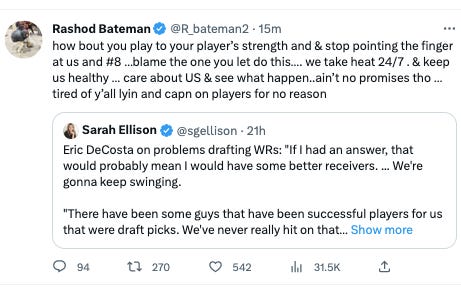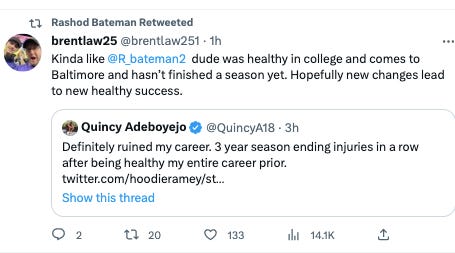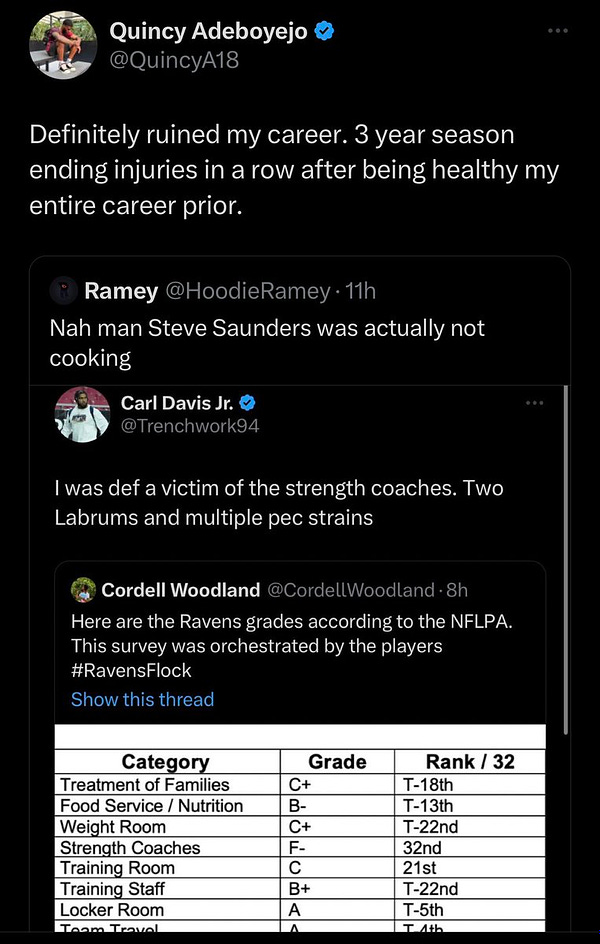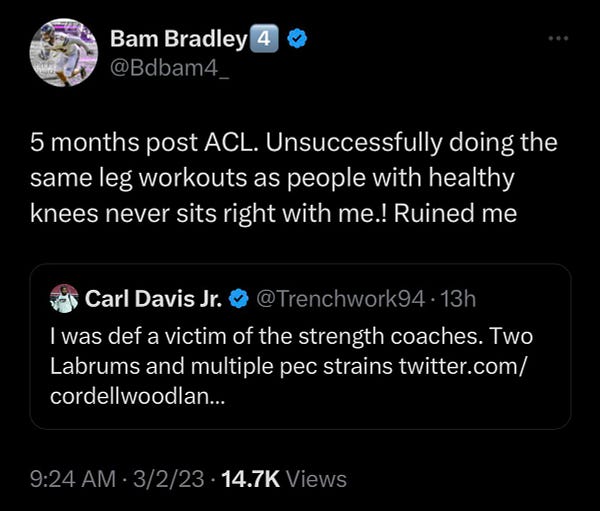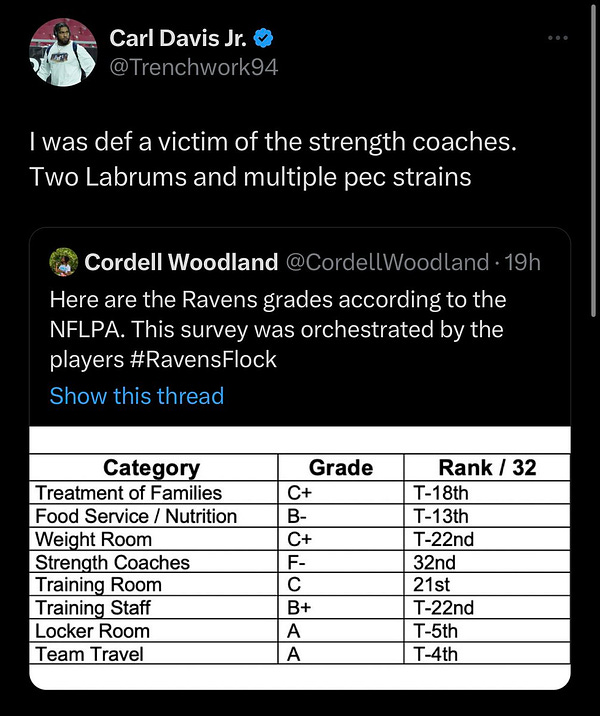The Ravens are having a dysfunctional offseason (so far)
Luckily, there's still one big move the Ravens can make to turn the tide.
The Ravens have been a fairly stable franchise in their 27-year history. In that time, they’ve made 14 postseason appearances, claimed six AFC North titles, and have won two Super Bowls. They’ve also had just three head coaches and two general managers.
However, in the early part of this offseason, no team has faced as much drama as Baltimore. OK, besides Washington, given the latest of Dan Snyder’s wrongdoings. But at least in pure football terms, the Ravens have received plenty of criticism, mostly in the form of player frustrations.
Let’s review what’s happened in recent months, and then look ahead to what comes next for the Ravens.
The lack of progress with Lamar Jackson’s contract talks
Last offseason, former NFL MVP Lamar Jackson was eligible for a contract extension. Jackson, who does not have an agent, and Baltimore’s front office couldn’t reach an agreement. Once the season started, Jackson halted any talks and played out the final year of his contract.
Two other quarterback extensions factored into Jackson’s negotiations. Deshaun Watson’s record-setting deal with the Browns was fully guaranteed, despite Watson’s sexual misconduct allegations. Russell Wilson also received a hefty chunk of guaranteed money from the Broncos, albeit not fully guaranteed like Watson’s, which gave the Ravens the excuse they needed not to offer Jackson the same.
Jackson’s 2022 season was a bit of a Rorschach test. If you think the Ravens should pay him whatever he wants, you can point to his age (he turned 26 in January), rushing stats (63.7 yards/game on 6.8 yards/carry), efficient passing numbers (QBR, TD percentage, EPA/play all ranked in the top 12 in the NFL), and the team’s record without him as the starter (2-4, including a playoff loss to the Bengals that could’ve been a win if Jackson had played1).
If you think the Ravens shouldn’t break the bank for Jackson and/or should move on from him, then you can point to his low passing numbers (186.8 yards/game, 48.3 completion percentage in the red zone), his increasingly fed-up demonstrations on and off the field, and his durability (he appeared in just 12 games due to a knee injury one year after appearing in 12 games due to an ankle sprain).
So far this offseason, Jackson and the Ravens don’t appear to be any closer on finalizing a long-term deal. In fact, they might be more apart than ever, even as GM Eric DeCosta expresses optimism when talking to the press.
This year, however, there’s a hard and fast deadline. The Ravens have until March 7 to decide whether or not to use the franchise tag on Jackson. At that point, they can either continue negotiations or they can trade him to another team willing to give the coveted quarterback the extension he desires.
If the Ravens do nothing — which is unlikely — then Jackson will be the top free agent on the market when the new league year begins on March 15.
Rashod Bateman claps back at the GM for his WR dig
Entering the season, Rashod Bateman was the Ravens’ WR1, as well as one of my breakout candidates. The 2021 first-round pick missed the first five weeks of his rookie year due to a groin injury, but he flashed once he got on the field. After Hollywood Brown was traded to the Cardinals, Bateman was expected to become Jackson’s top receiver.
Unfortunately, Bateman suffered a foot injury that kept him out for all but six games. And somehow he still finished fifth on the team in receiving. Tight end Mark Andrews, who led all Ravens for the third time in the last four seasons, totaled nearly twice as many receiving yards (847) as the guy right after him, Demarcus Robinson (458).
As such, Baltimore has one of the lowest-rated WR corps in the NFL, and the 2023 mock drafts have frequently projected the franchise to take another pass catcher in the first round. (I’m biased, but I believe Jaxon Smith-Njigba could absolutely end the Ravens’ ignominious “never drafted a Pro Bowl WR” streak, if he falls to them.)
At the NFL Combine, DeCosta was asked about the Ravens’ struggles at evaluating the position during the draft. He answered, “We've never really hit on that All-Pro type of guy, which is disappointing, I would say, but it's not for lack of effort.”
That didn’t sit too well with Bateman, who hadn’t had any major injuries before coming to the NFL:
Bateman has since deleted the tweet, but he’s clearly not the only current or former Raven to take issue with the offensive playcalling and the team’s strength and conditioning program. Baltimore addressed both problem areas by hiring new coaches to take over those roles. More on that below.
The Ravens’ ex-strength coach gets blasted, anonymously and publicly
Even before Bateman’s tweet went up, other players were calling out former strength coach Steve Saunders:
John Harbaugh announced Saunders’ firing only a week ago, before (and if I had to guess, not coincidentally), the NFLPA released its first ever report cards that graded each club for its facilities and treatment of players and their families.
Overall, the Ravens finished in the middle of the pack, but they had by far the worst grade in one category: strength staff. Most teams graded in the “A” range. Baltimore received an “F-,” which last time I checked was not a real grade. That’s how you know it’s bad.
Saunders had been with the Ravens since 2016, and since then, they have consistently been among the most injured teams in the NFL. According to Football Outsiders’ adjusted games lost metric, the 2021 Ravens were the most injured team this century.
That same year, Matt Judon, in his first season with the Patriots, tweeted “#firesteve” in response to Deshon Elliott’s season-ending biceps injury. Judon re-upped that opinion this week after the NFLPA grades came out.
The good news is that the Ravens finally saw the light and dumped Saunders. TBD on if the strength and conditioning improves under new coordinator Scott Elliott, who spent the past few years as Saunders’ assistant coach.
Baltimore welcomes a new OC after a ton of complaints about the offense
Last year, Hollywood Brown requested a trade, which the Ravens granted him during the NFL Draft. He wasn’t a fan of the “too conservative” offense, though he later clarified that he had no problem with Jackson and that the QB could succeed in “any type of offense,” not just a run-first one.
As it turns out, even the players who should star in that kind of offense had lost all patience with OC Greg Roman by season’s end (just like the fans).
Immediately after the playoff loss to the Bengals, running back J.K. Dobbins unloaded about the playcalling, specifically why he didn’t get any red-zone touches on the drive that ended in Tyler Huntley’s game-turning fumble.
It was certainly baffling, especially considering the effort Dobbins gave when he scored Baltimore’s first touchdown that evening:

Roman had been under fire most of the season — the passing attack averaged the fifth-fewest attempts and yards in the NFL, and the offense failed to score more than 17 points in a game after Jackson’s injury. The wild card loss was the final straw, though. Soon after, the Ravens and Roman “parted ways,” as the euphemism for “don’t let the door hit you on the way out” goes.
Taking over for Roman is Todd Monken, who had spent the past few seasons at Georgia. There, he transformed Stetson Bennett — shorter than Bryce Young and barely younger than Jackson — into a two-time national champion who could sling it downfield (the Dawgs also had plenty of help from an elite defense, one that knocked out Jameson Williams and Marvin Harrison Jr. in back-to-back years and wouldn’t have titles without doing so, BUT I DIGRESS).
Monken, on paper, is a slam-dunk hire, someone who can get creative with the run game and isn’t afraid to air it out. That’s the kind of offense that could help develop Jackson as a passer and keep both the running backs and wide receivers happy.
Of course, first the Ravens have to lock down Jackson. That brings us to …
So what should the Ravens do next?
The answer is both simple and not simple:

I have no doubt that contract negotiations are trickier when a player doesn’t have an agent, but the Ravens really shouldn’t play hardball with Jackson, either. You can’t just replace a dynamic, dual-threat quarterback like Jackson, one of the best playmakers the NFL has seen in recent years.
As Calais Campbell said, “We can't just put anybody back there and expect to be a great football team." We saw as much when Jackson was sidelined.
Campbell isn’t the only teammate to lobby for Jackson to stay with the Ravens, or the only NFL player, or the only professional athlete. Harbaugh has also made it known how much he believes in Jackson, who doesn’t want to leave:

Jackson will hopefully get the deal he’s looking for, which would be the most favorable outcome for both the quarterback and the team. The Ravens have already made changes this offseason to fix two of their biggest headaches. If they keep Jackson around with a long-term extension, then suddenly the offseason goes from a PR disaster to a turning point for a potential Super Bowl contender.
Despite what Sammy Watkins suggested, I don’t think Jackson was healthy enough to play in the Wild Card Round, based on what Jackson and Harbaugh have said since. I also don’t particularly care because it’s a decision between Jackson and his doctors. It’s been just two months since Damar Hamlin collapsed on the field. Just this past week, Byron Jones warned the incoming draft class about long-term injuries because, at age 30, he “can’t run or jump.” We also learned that Irv Cross, who died two years ago, had the most advanced form of CTE. If an athlete says he can’t suit up, for whatever reason, then we as fans should respect that. After all, the players are the ones putting their bodies on the line.




